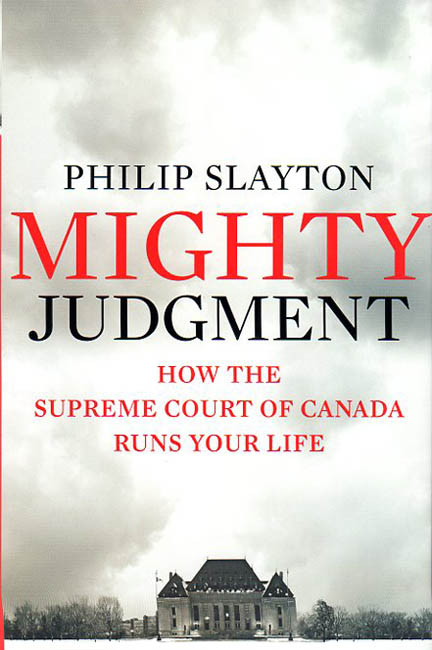As the Supreme Court of Canada sits today in hearings over a national securities regulator, a new book about the judges of the country’s top court has just hit the shelves (and e-book readers).
 Canadian Lawyer columnist Philip Slayton’s Mighty Judgment: How the Supreme Court of Canada Runs Your Life argues that essentially the court is a political institution and the judges are “politicians in robes.” And while judges aren’t elected, they are appointed by politicians. He points out that by the end of 2015 four judges will reach the mandatory retirement age of 75 and their replacements will be picked by whomever is prime minister at the time.
Canadian Lawyer columnist Philip Slayton’s Mighty Judgment: How the Supreme Court of Canada Runs Your Life argues that essentially the court is a political institution and the judges are “politicians in robes.” And while judges aren’t elected, they are appointed by politicians. He points out that by the end of 2015 four judges will reach the mandatory retirement age of 75 and their replacements will be picked by whomever is prime minister at the time.
The book is not written for a legal audience, but rather to shed some light on how it works, what it does, and how it affects the lives of every Canadian. Slayton concludes that the Supremes do a “good job” of running our lives but that “big changes are needed” — most importantly in how judges are appointed.
He’s not saying that there are, or have been, bad judges appointed to the court. It’s the “process — and not just outcome” of choosing judges that’s important. While he doesn’t promote the same process that is used in the United States, Slayton asks: “Why should we be scared of a little public pushing and shoving when it comes to picking judges.” Their personal politics will obviously inform their decisions so they should be held accountable for them before being appointed to the bench.
Slayton, a former clerk at the Supreme Court, managed to get decent access to judges, both current and former, to get a rare feel and understanding of the workings of the court. He spoke to five of the eight living retired Supreme Court judges, who he says were “remarkably candid and helpful.” He asked to interview all of the sitting judges and in the end sat down with Chief Justice Beverly McLachlin and justices Louis LeBel and Marshall Rothstein.
He also spoke to lawyers who appeared frequently at the Supreme Court as well as journalists, writers, and academics for background and insights. He did not have particular success, as he notes in Chapter 14, in talking to former law clerks. He points out the main source for the book was the written word in the form of decisions, and books and articles written about them.
An interesting read, with some unusual insights into the personalities of those who work in and what happens in the somewhat remote building on the banks of the Ottawa River.
 Canadian Lawyer columnist Philip Slayton’s Mighty Judgment: How the Supreme Court of Canada Runs Your Life argues that essentially the court is a political institution and the judges are “politicians in robes.” And while judges aren’t elected, they are appointed by politicians. He points out that by the end of 2015 four judges will reach the mandatory retirement age of 75 and their replacements will be picked by whomever is prime minister at the time.
Canadian Lawyer columnist Philip Slayton’s Mighty Judgment: How the Supreme Court of Canada Runs Your Life argues that essentially the court is a political institution and the judges are “politicians in robes.” And while judges aren’t elected, they are appointed by politicians. He points out that by the end of 2015 four judges will reach the mandatory retirement age of 75 and their replacements will be picked by whomever is prime minister at the time.The book is not written for a legal audience, but rather to shed some light on how it works, what it does, and how it affects the lives of every Canadian. Slayton concludes that the Supremes do a “good job” of running our lives but that “big changes are needed” — most importantly in how judges are appointed.
He’s not saying that there are, or have been, bad judges appointed to the court. It’s the “process — and not just outcome” of choosing judges that’s important. While he doesn’t promote the same process that is used in the United States, Slayton asks: “Why should we be scared of a little public pushing and shoving when it comes to picking judges.” Their personal politics will obviously inform their decisions so they should be held accountable for them before being appointed to the bench.
Slayton, a former clerk at the Supreme Court, managed to get decent access to judges, both current and former, to get a rare feel and understanding of the workings of the court. He spoke to five of the eight living retired Supreme Court judges, who he says were “remarkably candid and helpful.” He asked to interview all of the sitting judges and in the end sat down with Chief Justice Beverly McLachlin and justices Louis LeBel and Marshall Rothstein.
He also spoke to lawyers who appeared frequently at the Supreme Court as well as journalists, writers, and academics for background and insights. He did not have particular success, as he notes in Chapter 14, in talking to former law clerks. He points out the main source for the book was the written word in the form of decisions, and books and articles written about them.
An interesting read, with some unusual insights into the personalities of those who work in and what happens in the somewhat remote building on the banks of the Ottawa River.







